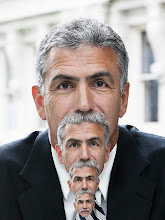"Three Scenes from Jurassic Park"
T-rex chews up the jeep with the kids inside.
When he bellows from the depths of his
tremendous chest, my six year old son roars,
"I know what he's saying; he's saying,
'I'm king and I can do what I want!'"
The gallimimus herd wheels every which way,
trying to escape the pursuit of King Tyrant Lizard.
My ten year old son, who can actually pronounce
pachycephalosaurus and every dinosaur in print,
informs me that coloring dinosaurs is guesswork,
and I can assign them any color I please.
Dr. Grant stares out the helicopter window
at a flock of birds which, as the theory goes,
evolved from dinosaurs, and I think maybe
there's hope for a bellowing world after all
if T-rex himself could lose the drive to be king
renouncing his title, diminishing himself until
the orange chest held just enough air for a song,
until fledgling wings delivered him into the sky.
*****
A year ago I bought a quarterly poetry journal for a quarter at a used book store.
One poem stood out to me in it. It was "Three Scenes from Jurassic Park," by Mike Ramm. The poem took a pop-culture resident and extracted something inspired from it. I love it when stuff does that.
On a lark, I googled "Mike Ramm," and found an email address. It turned out to be the same Mike. He's agreed to let me use the poem, and also answered a few questions for me. What a swell dude.
Mike Ramm Q &A
Question # 1. What is poetry to you?
I certainly hold with Robert Frost when he says a poem is a momentary stay against the confusion of the world. The key word, of course, being momentary. A poem temporarily crystalizes something that is otherwise ineffable.
Question #2 What do you do?
I've been teaching high school English for twenty-two years. (So what do you plan to do with your degree in English, Jeff?)
Question #3 Do you still writing occasionally?
Just starting to write again. Something about 9/11 forced the writer in me underground. Paying too much attention to politics is toxic to the imagination. Not surprising, though, my recent poems mostly focus on environmental and cultural issues.
Much thanks to Mike for his help.




